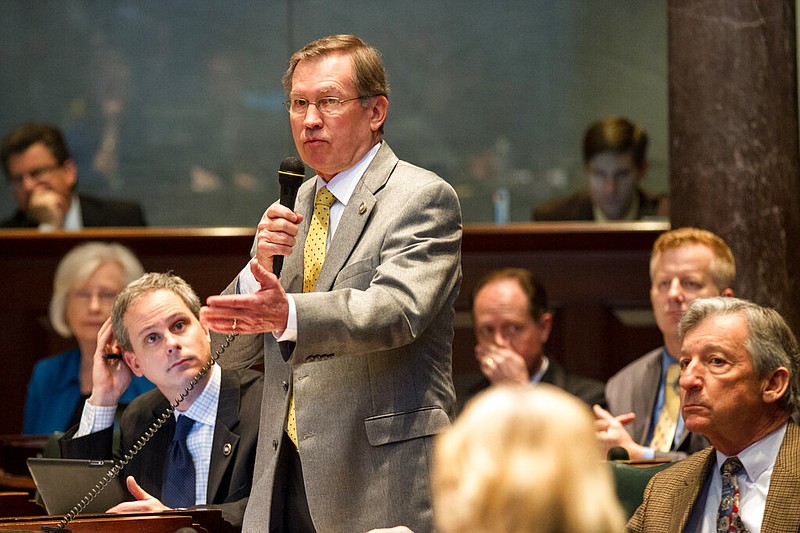The bail bond industry thought it pulled the plug on legislation dramatically changing the criminal justice system and money bail during summer hearings.
Bail agents captured lawmakers' attention by putting a human face on the industry, while victim advocates reinforced the need to keep some defendants in jail because of the danger they could pose before going to court.
Some said they feared Tennessee would start no-bail or low-bail programs that are taking shape in the nation's largest cities.
Despite the summer setback, Sen. Ferrell Haile is continuing to gather information in a series of statewide meetings focusing on bail reform to bring his bills before the Tennessee General Assembly again in 2022.
The pieces of legislation he proposed earlier this year, Senate Bill 804 and Senate Bill 805, "are really just skeletons," said Haile, who has held 10 meetings across the state and seen different issues arise at each one.
"None of the ideas are my ideas. They are ideas that have come up across the state," said Haile, a Gallatin Republican. "Some of them are workable and some are not."
On one hand, advocates of reform say defendants are being kept in jail wrongfully because they can't afford to make bail, effectively criminalizing poverty. Those pushing for change say the justice system shouldn't rest on how much people can afford to pay.
Haile said he isn't trying to get rid of the bail bond industry. Those in the business aren't so sure.
The Tennessee Constitution already requires "individual consideration" for how bail is set and whether a defendant is released on their own recognizance, Haile said. Critics of the legislature fear that could change.
But Haile said the legislation, once crafted, will put counties on a "more solid footing."
Rep. Michael Curcio, a Dickson Republican who is carrying the legislation in the House, said he doesn't know how similar the 2022 legislation brought will be to what was studied this summer.
"I think there'll probably be new bills filed because that summer study session really went off in a lot of different directions from what Ferrell's original bills went into," he said.
Victim advocates opposed the legislation during hearings this summer, and they'll likely be doing the same again when the General Assembly returns in 2022, just as companies backing bail reform will be supporting the bills.
Bill Nolan, a lobbyist for the bail bond industry, said he believes the legislation could be catastrophic for small bail bond companies and increase crime at the same time, cutting the legs out from under bail agents who are responsible for making sure defendants show up for court.
If not, they have to find them or hire a bounty hunter.
One piece of legislation, SB804, would take bail decisions away from judges and put them under the auspices of the commissioner of the Department of Commerce and Insurance, Nolan said. He said that is a dangerous move, in that it would remove crucial rulings from the jurisdiction of the courts. And because of the red tape involved in state government, the bill would make it more difficult to get rid of bad bail agents, Nolan said.
Haile, though, said the measure only requests that the Commerce and Insurance Department keep a listing of bond agents who have met minimum requirements, including FBI fingerprints, continuing education requirements and records showing no felony convictions. The list would be provided to judges and is part of his plan to clean up the bail bond industry and make sure "felons aren't monitoring felons."
A second piece of legislation, SB805, would do numerous things that could undercut the bail bond industry and put it in the hands of big business, Nolan said.
For one thing, it would allow defendants to be released on their own recognizance if their record could be expunged, a move that could send dangerous people back into the community for weeks before a court hearing, Nolan said.
Haile said it is "absolutely false" that his legislation would let dangerous people out of jail before their court date.
"In fact, I think they're strengthening that. I don't think that is the case at all," Haile said.
As for whether it will undercut mom-and-pop bail bonding companies, Haile said he believes "in the long run, it will help them." Only companies that are "abusing people and abusing the system" will be opposed, he said.
In addition, it would require defendants to pay the court clerk to be released on bond, instead of a bail agent. Thus, it would turn the court clerk into the bail agent, making the clerk responsible for making sure the defendant shows up in court, Nolan said.
Haile said that option remains open, and he noted some people like the idea, even though it creates "fear" for some bail bond agents.
"If we can eliminate the bad actors and stabilize what a bond actually means, right now a judge can set the bond, but essentially ... the bonding companies are setting the bond because they're discounting them so much," Haile said.
(READ MORE: National bail fund to expand in the Deep South)
He pointed toward a case in which two bonding agents in West Tennessee came together to put up the bond for a murder trigger man and discounted it, in addition to insuring it, leaving no risk for themselves.
Nolan said that "crime is exploding" because of these types of reform efforts across the nation.
Read more at TennesseeLookout.com.
